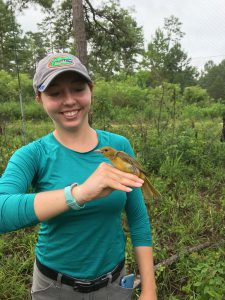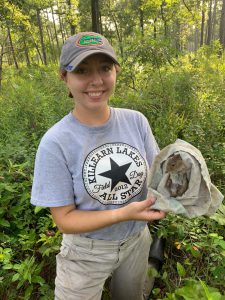By Katrina Rossos
Shannon Summers, a junior at University of Florida majoring in wildlife ecology and conservation worked as an intern over the summer at Tall Timbers Research Station in Tallahassee, Florida. She worked with Katie Hooker, a WEC Ph.D. candidate who works in Bob McCleery’s lab.
Originally from Missouri, Summers moved to Coral Springs, Florida when she was 12 and has had a love for the outdoors and animals since she was a child. “I went through that phase that most kids go through when they love animals and thought I wanted to be a vet,” Summers explained. “It was when I was watching a National Geographic show that I realized I wanted to do more than just take care of their health, I wanted to study them and their ecosystems. As I took more biology classes in high school I realized I could use my love for animals and the outdoors and make a career out of it through science.”

Summers first found out about the Tall Timbers internship program through the WEC mentor-mixer program where Hooker discussed her research and the internship position that was available.
“The research she is conducting at Tall Timbers is a population ecology study of small mammals,” Summers said. “She wants to see if supplemental feeding can create a population boom in the small mammal population.”
Summers assisted Hooker with data collection in the field and data analysis in the lab. Her field responsibilities included setting camera taps, putting out and picking up pitfalls, assisting with small mammal trapping, conducting vegetation sampling, and refilling feeders. When she was in the lab, Summers did data entry, examined pitfall data, and processed the data from the camera traps.
“The great thing about this internship is that I got to know all aspects of her research project, from putting out the traps and collecting the data to then analyzing the data back in the lab,” Summers commented. “I learned a lot about experimental design and how conducting research out in the field actually works.”

Throughout the experience, Summers learned that climate, predation, and food quality all have an impact on small mammal populations. Additionally, vegetation sampling and pitfall analysis helped Summers sharpen her plant and invertebrate identification skills. “I also learned a little bit about Northern Bobwhite ecology since Tall Timbers is known for their study of quail and I participated in a couple brood captures,” Summers said.
One of the most memorable experiences during the internship involved trapping for mice and cotton rats, but the research team found something unexpected in the trap – an Eastern Cottontail rabbit! “Everyone stopped and immediately went over and took a bunch of photos,” she exclaimed. “We all got a photo holding it and took a video when we released it, it was a lot of fun.”
Looking to the future, Summers explained that she is interested in endangered species and habitat conservation. While she is still figuring out what direction she will head with her career, she is leaning towards conservation biology or examining anthropogenic effects on threatened species. “I think it is very important to conserve the natural resources we have left and protect species that are vulnerable,” she said.
The Tall Timbers internship, however, was a great step in helping Summers better understand what type of research in which she is interested. “I gained so much in two months and learned more about conducting field research than I have just by taking classes at school,” she noted. “It was absolutely an invaluable experience and helped me realize that field research is definitely something I’m interested in and want to be a part of my career.”
 0
0
